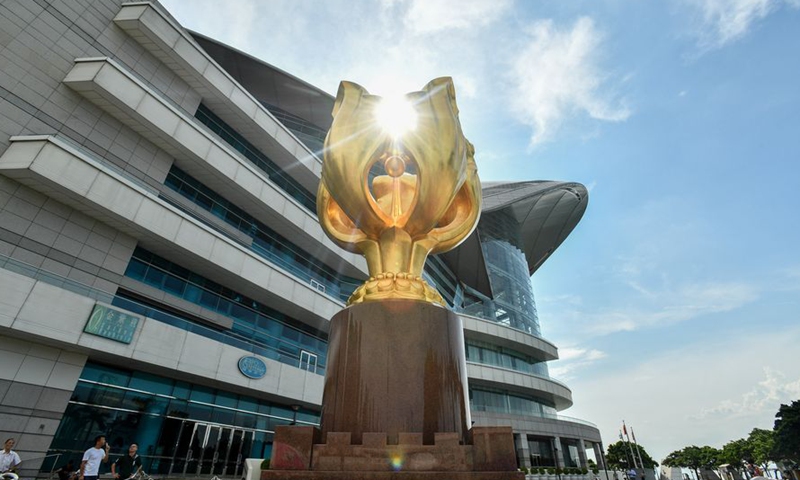US consulate risks closure if it grants political asylum to HK secessionists: expert
By Cui Fandi and Bai Yunyi Source: Global Times Published: 2020/10/28 20:26:24

Photo taken on Aug 20, 2019 shows the Golden Bauhinia Square in Hong Kong, China.Photo:Xinhua
The US consulate in Hong Kong and Macao reportedly rejected four Hong Kong secessionists seeking political asylum on Tuesday, which was a "wise move" because offering asylum to secessionists could risk the closure of the consulate, experts noted.
The Hong Kong secessionists entered the consulate in Hong Kong on Tuesday afternoon seeking political asylum, but were rejected. At least one of them faces charges stemming from last year's anti-government protests, South China Morning Post (SCMP) reported Tuesday.
Tony Chung, former leader of pro-secession group Studentlocalism, was detained by members of the police national security department while attempting to seek asylum at the US consulate, the SCMP reported.
Two other members of Chung's now-disbanded group, Yanni Ho and William Chan, were also arrested later on Tuesday, the group claimed.
Hong Kong police confirmed with the Global Times on Tuesday that two males and one female were arrested on Tuesday under suspicion of publishing content that encourages secessionism in violation of the national security law. But the police didn't give the name of the suspects arrested. When asked to comment on the matter, Chinese Foreign Ministry Spokesperson Wang Wenbin said at Wednesday's news conference that Hong Kong is a society ruled by law, and the lawful rights and interests of Hong Kong residents are fully protected in accordance with the law. Any illegal or criminal act should also be investigated.
Wang stressed that Hong Kong affairs are purely China's internal affairs, and China opposes interference of any country in China's internal affairs.
The US consulate in Hong Kong said it does not have anything to offer regarding the issue in an email reply to the Global Times on Wednesday.
With the surprising silence from the US consulate, observers suggested that the US becomes more cautious after the national security law for Hong Kong SAR took effect.
"The US wants to avoid a diplomatic conflict with China, especially during the presidential election," Li Xiaobing, a Hong Kong affairs legal expert at Nankai University in Tianjin, told the Global Times on Wednesday.
"If the US took Chung in, China will certainly respond. If the two sides fail to reach a consensus, Chung will have to stay at the consulate," Lau Siu-kai, a vice-president of the Chinese Association of Hong Kong and Macao Studies, told the Global Times on Wednesday.
Despite the recent US move to include for the first time asylum claims from Hong Kong in its refugee admissions program following the national security law for Hong Kong, which might be in favor of asylum seekers, they got turned down immediately.
"It would be against international law and the consensus of the international community if the US were to accept political asylum cases from Chinese citizens in China," Li noted.
In July, the US ordered to close China's consulate in Houston, and as a countermeasure, China closed the US consulate in Chengdu. The incidents escalated China-US diplomatic tensions. The over-staffed US consulate in Hong Kong was later loathed as a "spy center," and anger mounted among the Chinese public over US meddling in Hong Kong affairs.
"If the US extends a hand to the Hong Kong secessionists, it will only reinforce China's suspicion on the US' role behind the riots in Hong Kong," Lau warned, "and if the US consulate becomes a haven for rioters, it runs the risk of being shut down by the order of the Chinese government."
"The US' move is also out of political concerns, since insignificant asylum-seekers have no political value to the US," Lau said, "It won't risk the consulate's closure for unknown social activists."
"The move by the US consulate also indicates once again that there is less and less room for secessionists in the Hong Kong society," Fan Peng, a member of the Chinese Association of Hong Kong and Macao Studies, told the Global Times on Wednesday.
RELATED ARTICLES:
Posted in: HK/MACAO/TAIWAN